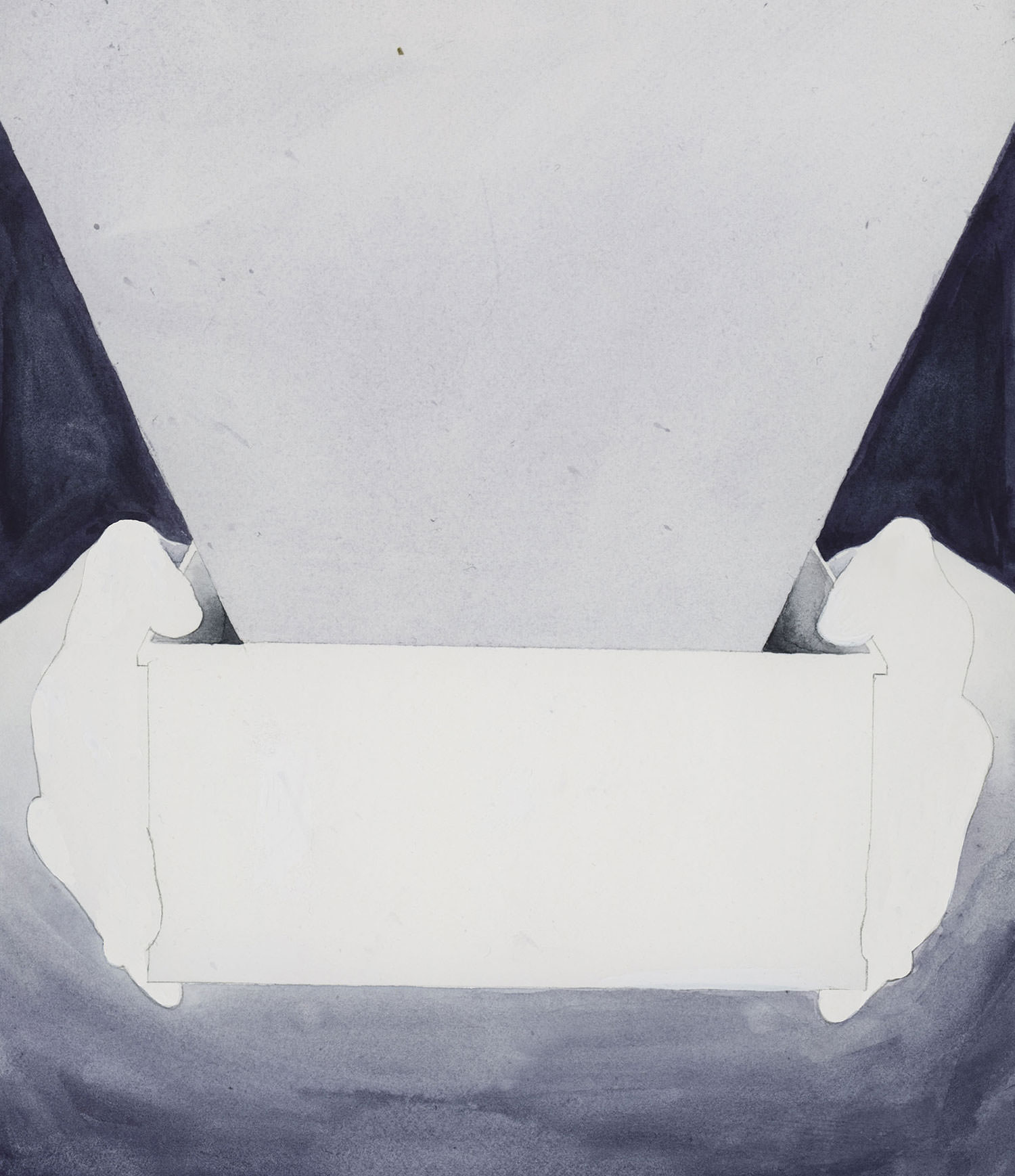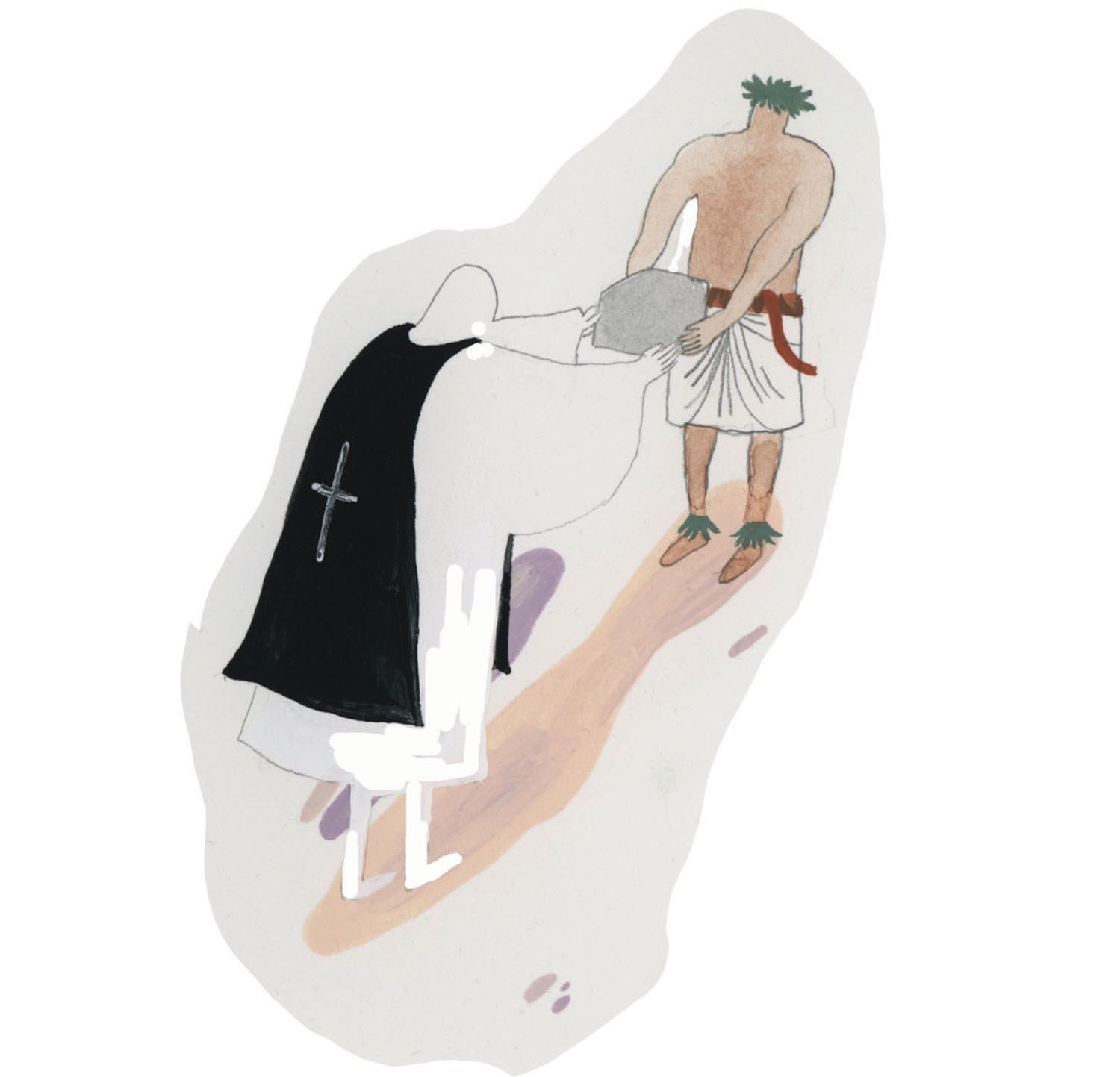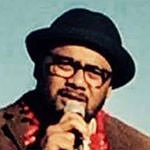
New York City is one of those places where you never know what you’re going to find. During my time as a graduate student, browsing through old antique shops became a hobby of mine. I often felt like a child on a treasure hunt searching for hidden gems on bookshelves.
One particular find, a small wooden box, brought much joy to my spirit. I first saw the box in the window display of an antique shop. It looked familiar, but I couldn’t place where or when I had seen it before.
I had to get a closer look, so I asked the shopkeeper to see it. I felt tingles of excitement throughout my body as he began to open it, and when I saw the 100 small pieces of paper neatly rolled up like mini scrolls inside, I felt as if I had traveled through time.
It was then when I realized why this box looked so familiar — my great-grandmother Luisa in Samoa had a box just like this when I was a child. This, the shopkeeper told me, was a promise box. The name “promise box” described all the feelings, memories, and spiritual practices that reminded me of my Grandma Luisa.
Every morning between 4:30 and 5:00 a.m., Grandma Luisa would wake me up to pray with her. After prayer, she read one of the scrolls, either a Bible Scripture or a daily devotional prayer, from her promise box. She would then explain the contents of the scroll to me in my Samoan language. Finally, she’d reach her beautiful, shriveled 90-year-old hand down between her mattress and pull out the real reason I entertained her a.m. prayer rituals — a huge bag of Hershey’s Kisses (as a 10-year-old, incentives for such early rituals were important).
Rituals are paramount to Samoan people; rituals have always been an important way of remembering our forebears. Grandma’s whole life consisted of rituals. Of course, there were her Christian rituals, but Grandma also told stories of non-Christian rituals, rituals linked to her Samoan identity and my ancestors. Grandma Luisa’s tone was bittersweet every time she spoke of old Samoa. It was as if she wanted to share so much more, but felt certain limitations as to what she could share with me.
I speculate that Grandma’s Christian practices of rituality were influential in her reluctance to go into detail about old Samoa, because many of the practices of my ancestors were seen as impure and evil, and abolished by early Christian missionaries. Thankfully, many Samoans, including myself, have taken up the task to change the missionary narrative.
While reflecting on rituals, I thought of my three young daughters, and wondered what tangible reminders I would leave them. I thought to myself: Why not make my own promise box? But what would that look like? Though my great-grandmother’s faith has been the example I have always tried to live up to, my ministry and spirituality differs immensely from hers. I imagined my promise box to reflect my ministry, scholarship, and activism.
Most importantly, the contents of my promise box would be a mixture of spiritual joy and deep pain because that’s honestly who I am as a person, father, and clergy. I don’t want my girls to just remember the things that brought me joy or uplifted my spirit. I want to be honest and also share with them my fears, pain, and sorrow. I want them to know that, to quote my dearest professor James Cone, I wrestled constantly with God.
My promise box would be Christian and indigenous Samoan, filled with things I would leave my girls that they would eventually come to experience on their own.
Discovering my true Samoan-ness
Deciding the contents of my promise box made me realize something very unsettling: Everyone is born with certain expectations already thrust upon us, and cultural and religious expectations are no exception. I had no choice in becoming a Samoan or a Christian, and neither did my parents, their parents, and all of Samoa before them. Still, Samoan identity and religion is mainly how I — and all Samoans — view the world according to our indigenous understandings of the Divine. But my Christian identity, has also shaped my view of the world. Sadly, Christianity was also fiercely against any notion of coexisting with the deities of my ancestors.
To paraphrase Hawaiian scholar and activist Haunani Trask, the question of religious identity and religious belonging has always been a tool of colonialism. Belonging to the “right religion” was inextricably linked to missionary activity in the South Pacific that prioritized conversion, arguably colonialism’s most effective device, at least in Samoa.
All of the feelings and inner struggles I experienced throughout my life — the questions about God, the gods of my ancestors, and the condemnation of cultural rituals that were so valuable to indigenous Samoa — surfaced during a class I took at Union Theological Seminary. The class, entitled “Double-Belonging”, was taught by professor John Thatamanil and focused primarily on people living their lives as adherents of two religious identities. I had a personal interest in the readings about colonialism and the high price indigenous people paid to become part of the Christian family.
Finally, people were asking the questions I often felt extremely guilty about for merely thinking. This class was liberating — I was having conversations with people who helped me address the internal fear of questioning the religion of my and Samoa’s colonizers.

For missionaries, local gods were seen as mere natural objects and idols that led Samoan people astray and obstructed the pathway to salvation through Jesus Christ. This, however, is not the Christian I want to be, and this is not anything I want to pass on to my children. I want my children to know that their indigenous identity is not an obstruction to their Christian faith. Rather, Samoan indigenous spirituality is our first testament to God. It is our first pathway, and the Gospel of Jesus has only illumined that path, contrary to early missionary teachings.
In addition to being a father, I also have responsibilities as a clergy member of the Christian church in Samoa. Members of the clergy are responsible for caring and nurturing the spiritual life of the church. I am mindful of the ways Samoan people have come to love their Christian-ness, and how that identity has been their only home and source of spirituality regardless of Samoa’s indigenous spiritual practices. I am conscious that many Samoans believe in true salvation through Jesus, and that continues to sustain them and their families. They truly love Jesus with mind, body, and soul. I have no reservation in saying that I, too, am one of those Samoans, which is why I have chosen to return, resurrect, and reclaim my Samoan-ness alongside my Christian identity. A significant part of reclaiming my Samoan-ness means retelling the stories of my ancestors, and the rituals they practiced as a response to the old Gods of Samoa.
But as a member of the clergy, I have a responsibility to what the Gospel ultimately proclaims to the world: the truth. And the truth is that before I was Christian, I was Samoan first. But what would such a statement entail? It meant revisiting old Samoa, or pre-Christian Samoa, however difficult it may prove to be personally and spiritually. Still, I knew it was necessary, and it was a journey of faith to find my truth as a Samoan-Christian.
Liberation
James Baldwin once said: “Not everything that is faced can be changed, but nothing can be changed until it is faced.” I have had to face many unsettling truths about European missionary motives as a scholar, theologian, and clergy. However, discovering the truth about the rituals and Gods of my ancestors has been a work of liberation. The rituals of my ancestors were our way of responding to God Tagaloalagi, Samoa’s indigenous supreme God prior to Christianity. I faced a crisis of faith; what was I to do with the God of my ancestors? Were the previous divine understandings, myths, stories, legends, and rituals of my ancestors in opposition with my Christian identity?
As a clergy member and theologian, my Christian identity informed an intimate reassessment of the abolished and demonized ritual practices of Samoa. As mentioned earlier, this was our first testament to the divine mystery. I often share that Christianity did not change the status of my Samoan people. It didn’t change the fact that indigenous people were still viewed as barbarians or savages in places like Africa, North America, Asia, and the Pacific. For many colonial powers, indigenous people merely became Christian barbarians and savages. Converting the savage meant colonizing them beyond their individual experiences; it meant owning their past, as well as their future. Even as Christians, Samoan people have had to struggle for liberation from colonial rule and Euro-centric ideologies under the façade of religion. In academic settings, Post-colonial studies place a huge emphasis on liberating indigenous people from toxic European ideologies that have led to the disappearance of cultural knowledge and wisdom.
Liberating those who adhere to early missionary teachings is part of my ministry. Missionaries need to be liberated from the harmful, racist, and culturally insensitive teachings that project a gospel that preaches dominance of one people over another. As a Christian, I see the liberation of the oppressed as a work done predominantly by the oppressed community itself. However, if my ultimate goal is for the betterment of society whereby no person is cast down low, I must also give equal effort to liberate my oppressor from his or her self-destructive ways.
This is a work that is made possible by sharing with people the true values and teachings of my indigenous Samoan rituals. I want people to replace previous missionary notions of perversion when viewing Samoan sexuality with a deeper understanding of those rituals as a form of public discourse in old Samoa. I want missionaries to see the communal and collective value of our rituals, and recognize the irreversible damage their ideologies have done to Pacific cultures. Most importantly, I want Samoan people to see themselves, their past, and their ancestors for who they truly are: a people and culture uniquely designed by God as are all cultures.
A Promising Future
I began the concept of creating a promise box for my children with the intent of leaving something behind that would be symbolic of who I was personally, spiritually, and culturally. Those intentions shifted when I reflected on who Grandma Luisa was in real life. She was the matriarch of my family who lived to be 96 years young; she was a prayer warrior who prayed morning, noon, and night; she was a true Christian who made use of the life God gifted her. But Grandma never did anything specifically to be remembered; she just lived her life according to her values, her family, and her faith. I see us, her descendants, as living and breathing promise boxes.
I feel called to leave something tangible for my girls — not to remember who I am, but rather, to remember who they are. Grandma’s promise box reminded me of how much rituals were a part of my identity, both as a Christian and a Samoan. Grandma’s 4 a.m. ritual of prayer reminded me that our spirituality is deeper than the doctrines and creeds that order our steps in contemporary Samoa. The spiritual essence of Samoa was not introduced to us. Instead, it was who we already were before missionaries arrived. I experienced God at an early age through people who were deeply immersed in both the Samoan culture and their Christian faith. I want the same for my girls. I don’t want them to learn who God is, I want them to experience who God is in life, with my wife and I setting the example along with their grandparents, aunts and uncles, and others with whom they will cross paths. I think the best I can do for them is be honest and not hold back in preparing them for the future. I’ll start with building the promise box together with them.
We all need to find our own unique ways of responding to the Divine. Mine is inclusive of old Samoa, and the now mainly Christian Samoan context. By honoring the gods of my ancestors, I honor the God of my Christian faith. By doing so, I honor Grandma and pave the way for my children to experience faith and rituals not merely as requirements of a religion, but as vital traits of their truth, identity, and place in the world.

Pausa Kaio (PK) Thompson is a Samoan American clergy, activist and theologian. He is an alum of the Kanana Fou Theological Seminary in American Samoa, Union Theological Seminary in the city of New York, Boston University School of Theology, and is a Ph.D. student at Claremont School of Theology. His scholarly work accentuates the theological discourse, indigenous culture and wisdom, and social justice issues of Samoa, and Samoans in diaspora. His ministry encourages people to be change agents in the world by invoking a more socially conscious ethic of Christian practice.

Terry Yang was born in 1992 in Los Angeles, and earned her BFA in illustration from the Art Center College of Design. Terry Yang’s paintings feature hidden figures displayed in observational journalism of household diaries and outdoor expected behaviors, ruling to serve a break in the border of rejection and disbelief.